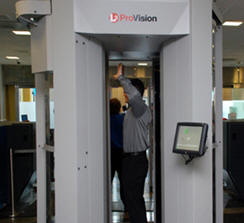|
|||||||||||||||||
|
|
|
|||
|
TSA Must Fully
Embrace Threat Based Aviation Security By Shane Nolan |
||||
 |
July 18, 2011 - Captain Lee Moak, president of the Air
Line Pilots Association, Int’l (ALPA), sent a letter to
the U.S. House Subcommittee on Transportation Security
reinforcing pilots’ call for a threat-based approach to
security screening that focuses on intent rather than on
objects, and for a Transportation Security
Administration reauthorization bill that enhances
successful security programs while working to close
existing gaps.
“We are gratified by the Transportation Security
Administration’s positive response to ALPA’s position
that a philosophical shift is needed in this country’s
approach to aviation security,” said Capt. Moak.
“Airline pilots are already thoroughly screened as a
condition of their employment.
We are particularly pleased with the administration’s support of alternative screening for pilots because it uses limited resources more effectively and moves away from a ‘one-size-fits-all’ approach to security.” |
|||
|
In the
letter, which was sent in preparation for the Subcommittee’s
hearing entitled “Industry Perspectives: Authorizing the
Transportation Security Administration for FY 2012 and 2013,”
Capt. Moak emphasized ALPA’s call for a screening system that
allows passengers with known backgrounds to be promptly cleared
through security and focuses greater resources on those
individuals whose background is unknown or in doubt.
In 2010,
ALPA released a white paper titled “Meeting Today’s Aviation
Security Needs: A Call to Action for a Trust-Based Security
System,” which advocated determining the risk posed by each
passenger through a combination of publicly available
information, human interaction, and behavior-pattern
recognition.
Capt. Moak
also cited the successful and widely respected Federal Flight
Deck Officer (FFDO) program, which positions federally
credentialed, armed pilots trained and managed by the Federal
Air Marshal Service to serve as the last line of defense of the
cockpit. He appealed to Congress to significantly increase
funding and managerial oversight of the FFDO program to help
realize its full potential as one of the most cost-effective
security initiatives implemented since 9/11. ALPA also underscored to the Subcommittee the need to improve threatened airspace management through the creation of a clearly defined, prioritized plan to control the national airspace in the event of a major terrorist attack. Such a plan would ensure the security of the air transportation system but avoid a total or substantial closure of the airspace. |
||||

